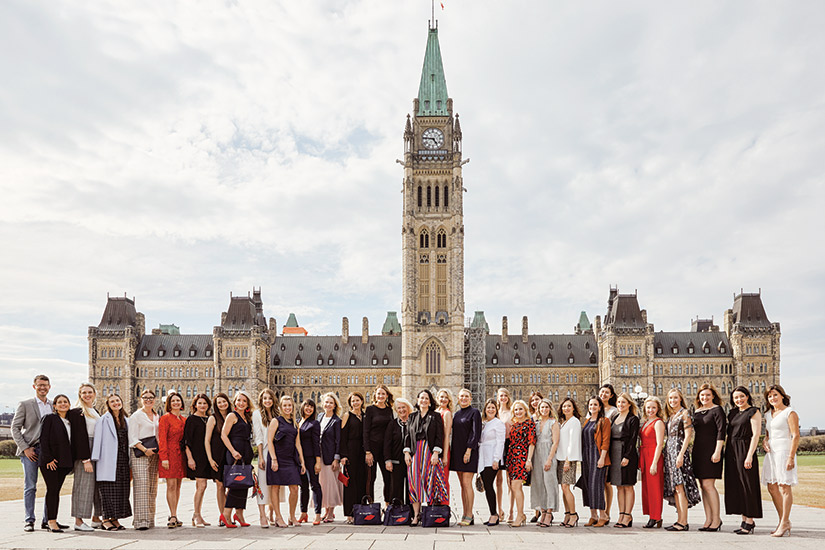I love beauty (a passion necessary for my beauty director gig) and consider myself a fairly political person, but I never thought my first trip to Parliament Hill would be with a beauty brand. And yet, on a windy spring day this past May, I shadowed 25 consultants for California-based makeup, skin- and body-care brand Beautycounter on a trip to Ottawa as they lobbied for stricter cosmetic regulations. Their goal: to amend the Canadian Environmental Protection Act (CEPA), which governs the ingredients used in personal-care products, and ask members of parliament (MPs) to include CEPA reform in their party platform for the upcoming federal election.
Though the meetings with MPs, senators and political staffers were private (meetings with constituents aren’t usually open to media), their four asks, as follows, are not:
1. Make the Cosmetic Ingredient Hotlist (a tool Health Canada uses to communicate prohibited or restricted-for-use substances in cosmetics) legally enforceable;
2. Ban phthalates (a group of chemical plasticizers—essentially, flexible plastics—often found in hairspray, fragrance and nail polish that have been shown to cause reproductive harm in certain quantities);
3. Require regular testing for heavy metals (which can naturally occur in rocks, soil and water from which pigments are derived) in colour cosmetics;
4. Require companies to list all ingredients currently hidden under the umbrella of “parfum,” “fragrance” or “flavour.” (Canada follows the International Nomenclature for Cosmetic Ingredients naming conventions, which says components of a fragrance can be listed as individual ingredients or under one of aforementioned terms. The concern is that suspect ingredients, like phthalates, could therefore be in a product without the user knowing.)
While Canada is hardly lax on cosmetic regulation—there are over 600 prohibited or restricted-for-use substances on the Hotlist, compared to only 30 on a similar type list in the United States—Beautycounter and its consultants (the brand’s term for direct salespeople) want to see more oversight. Their gold standard is the European Union’s cosmetics directive, which bans or restricts nearly 1,400 ingredients; Beautycounter themselves used it as the basis for their “Never List” of ingredients they will not formulate with.
One concern with the Hotlist is that it’s not legally enforceable, they say. According to Muhannad Malas, toxics program manager at Environmental Defence, a non-profit advocacy group working with Beautycounter on CEPA reform: “Health Canada communicates to companies the chemicals that are banned or restricted, but they don’t have the regulatory powers and the authority to enforce some of these bans.” He says this is problematic, as the group has seen cosmetic products containing ingredients at concentrations considered to be unacceptable, as per the Hotlist, on Canadian shelves.
Top-selling Beautycounter consultants from across Canada on a lobbying trip to Ottawa in May 2019 to discuss CEPA reform.
In an email, Geoffroy Legault-Thivierge, a spokesperson for Health Canada, said there is corrective action that can be taken if potentially harmful ingredients are identified in cosmetics. “If a company does not cooperate with Health Canada to voluntarily remove a product that represents a serious risk to human health or safety, Health Canada can escalate compliance and enforcement actions, which may include product seizure and/or detention,” he says.
Advocacy is an integral part of Beautycounter’s mission “to get safer products into the hands of everyone.” The certified B Corp has an in-house team dedicated to advancing this commitment, and regularly takes its consultants to lobby governments in the U.S. and Canada. Even in the burgeoning clean beauty scene, this level of boots-on-the-ground activism is a rarity—but it’s integral to achieving the company goals, says Gregg Renfrew, Beautycounter founder and CEO. “Only with action by the government can businesses thrive while making a lasting positive impact on the health of consumers and the environment,” she said in a statement about their recent Canadian lobbying efforts.
The all-Canadian, all-female group on the Ottawa trip were awarded their spots for being the highest-selling consultants in their respective provinces—a far cry from the infamous pink Cadillac once awarded to top-performers at another direct-sales company. It’s clear that for many, being a Beautycounter consultant is significantly more than your usual sales job. One woman jokingly referred to the level of competition to get to Ottawa as Hunger Games-esque; another postponed breast cancer treatment to make the trip. Those I spoke to from the group saw themselves as microinfluencers, educating friends, family and acquaintances—also, all potential customers—about the possible dangers of hormone disrupters and allergens potentially lurking in cosmetics.
Not everyone can physically visit Parliament to lobby, but Beautycounter is finding other ways to mobilize its 4,000 consultants and their respective networks across Canada. Directions on the packaging for the universally-flattering Beautycounter Red lipstick, launched to fete the brand’s sixth year anniversary this year, instructs the user to text “BETTERBEAUTY” to 70734, which redirects to a letter for MPs, encouraging them to take action on cosmetics reform.
Sending an email or adding your name to a petition may seem insignificant, but it can create serious momentum. A parliamentary petition, which needs the sponsorship of an MP, that gets a minimum of 500 valid signatures requires the government to look at it—and table a response. One Beautycounter consultant gathered 100,000 signatures on a petition she started last year. It’s still work, but it’s mission-driven, she tells me, which makes all the difference for her. “It feels good,” she says.

